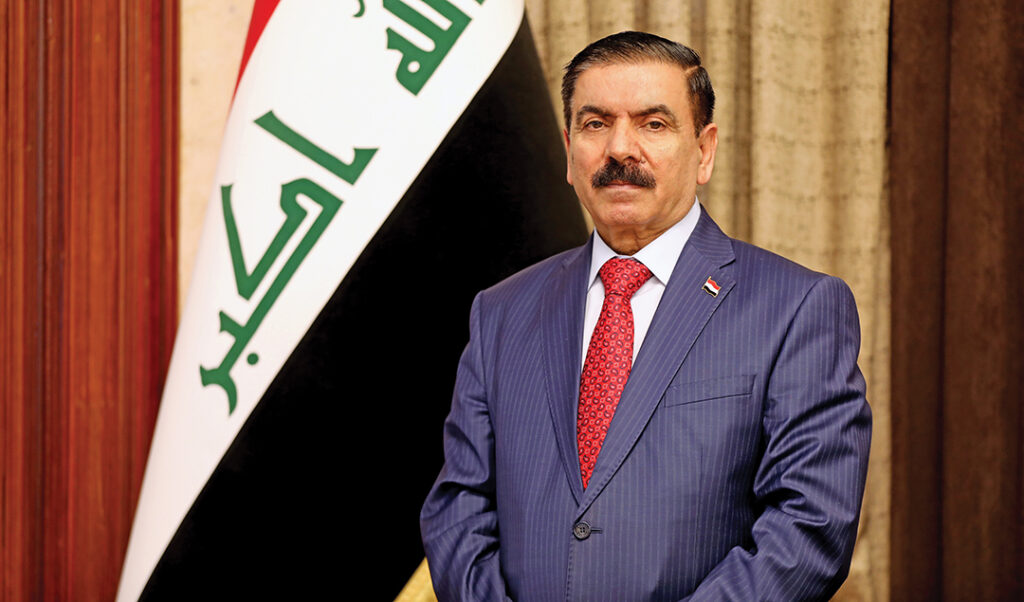I would like to extend my thanks to our friends at U.S. Central Command for their kind invitation to introduce this edition of the esteemed Unipath magazine, which includes stories about counterterrorism and expanding security in liberated areas. This edition also coincides with the 10th anniversary of Unipath, which has kept pace with events of the region and played a distinguished role in highlighting the impressive victories of our Armed Forces.
I would like to extend thanks and praise to members of the Directorate of Media and Moral Guidance within the Iraqi Ministry of Defense. They announced news of victory to Iraqi homes at a time when Iraqis were fighting against the lies and heresies of Daesh. When coalition aircraft were bombing Daesh terrorist hideouts on the outskirts of Salah al-Din governorate, the heroes of the directorate were handing out copies of Unipath on the front lines. The magazine reaffirmed the commitment of the coalition, led by the United States, to support Iraqi forces in liberating territory from the desecration of terrorism. The publication of stories about the heroics of our Armed Forces reassured the people of Iraq and the region because it proved that the Iraqi Armed Forces were capable of defeating terrorism and restoring Iraqi sovereignty.
Daesh’s occupation over swaths of our northern and western governorates represented a dangerous juncture in Iraq’s history. We found ourselves in an unpleasant situation, to the extent that some believed Iraq was headed toward anarchy and chaos. Daesh fighters committed unspeakable and chilling crimes against humanity. They not only targeted human beings but did not spare stones either, destroying human and historical artifacts with pickaxes because Daesh decided to rewrite history in accordance with the delusions of its leaders.
After the setback in Mosul, we studied the reasons why our forces broke down so quickly. We discovered a disequilibrium in the rebuilding of the Armed Forces after 2003. After June 2014, we decided to rebuild the military sector using contexts and approaches on which the Iraqi Army was traditionally based. We focused not just on the physical and tactical aspects of training, but also dedicated time, effort and resources to training our Soldiers on chivalrous conduct, commitment to human rights, and international treaties on the rules of war.
We are proud that we managed to train and fight simultaneously, and we were able to triumph on both fronts. When front-line units returned to the rear, they were reequipped and retrained. As they returned to the fight, other units took their turn getting rearmed and retrained. This approach continued until victory was achieved.
The battle against terrorism is complex and multidimensional, not only from a military perspective but from an intellectual, economic and cultural perspective. Domestic turmoil can serve as a breeding ground for terrorist sympathizers. This can create rifts on the homefront when terrorists exploit a fragile environment in which people suffer from poverty and unemployment. Terrorists incite discord and fight the state, and their imams misinterpret sacred texts to justify terrorist crimes against opponents. When they find a foothold among citizens, it is difficult to defeat them and eradicate their subversive ideology. Therefore, the security and intelligence services must hunt down those promoting these ideas and inciting action against the government, security services and other institutions.
Our friends in the international coalition forces have played a large role in field training and providing technical instruction on modern military hardware. We have reaped the benefits of the partnership through constant air, intelligence and logistical support. Even after liberation, the partnership has continued to bear fruit. The best example of this is the operation to kill the terrorist Abu Bakr al-Baghdadi and the operation to arrest his successor in the terrorist organization.
The phase after the liberation of cities is no less difficult than fighting within the cities, if not more difficult. Terrorism has left behind considerable destruction to infrastructure and a deep wound in society, while children have been exposed to violence and brainwashing. This requires a concerted effort by state and civil society organizations to rehabilitate this section of society and protect it from being a target for terrorism. We also need intensified intelligence efforts to hunt down sleeper cells and funding and recruitment networks. We also need the help of Iraq’s allies to exchange intelligence and identify terrorist networks outside Iraq, and we need collective action by all state institutions to rebuild liberated areas and restore their economies.
We realize that the defeat sustained by Daesh gangs does not constitute the end of the organization. Daesh could return at any place and time if its ideology survives. Combating the ideology of Daesh will be a long and costly. Victory within this context requires intent and collective action to develop basic services, provide opportunities for work and education and reintegrate sympathizers of Daesh and other terrorist organizations who have repented and have no innocent blood on their hands.
Thousands of children born to terrorist fighters live with their mothers in camps without basic services. These children are nurtured on the same ideology of hatred and murder that motivated their fathers. These ticking time bombs will catch up with us if we do not swiftly defuse them by integrating these children into society and enrolling them in government schools, ensuring their welfare and education.
To conclude, I would like to thank those in the Ministry of Defense for their sacrifices and service to Iraq. May our righteous martyrs receive mercy and forgiveness. I promise the Iraqi people that we will be loyal Soldiers and keep a watchful eye on Iraqi security and sovereignty.
Juma Anad Al Jubouri
Iraqi Minister of Defense

